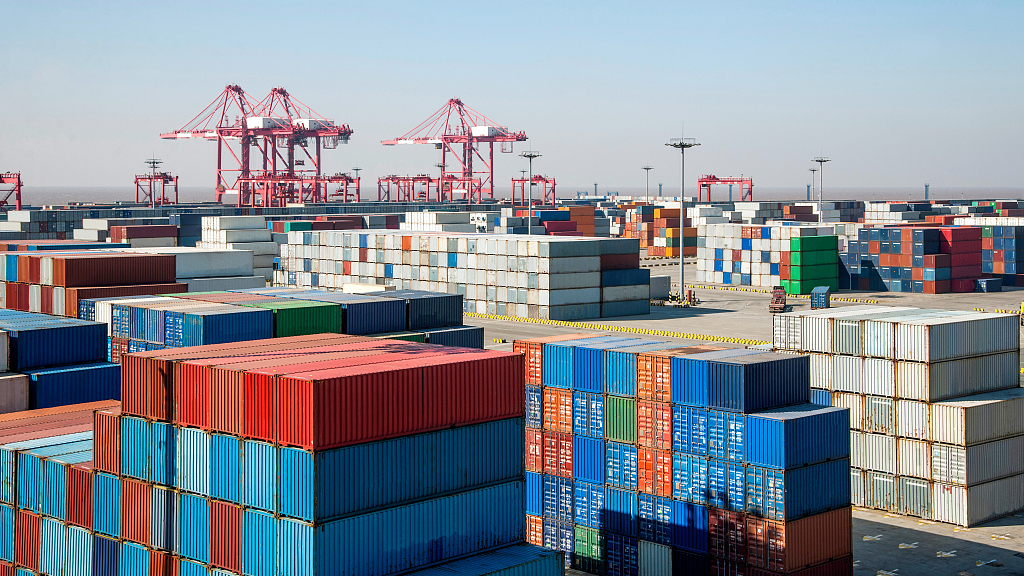
Editor's note: Zheng Yongnian is a professor at the East Asian Institute at the National University of Singapore. The article was first published in Chinese on the WeChat blog of the Public Policy Institute (IPP), South China University. The article reflects the author's views, and not necessarily those of CGTN.
Since nominated the Republican presidential candidate back in 2016, Trump has always had an acrimonious relationship with traditional political elites or media in the U.S. because of his "populist-authoritarian" leadership style. Trump represents almost everything that American traditions are not.
In the U.S., the idea of America's decline has been repeatedly brought up. Many believe that rather than delivering on his promise to "Make America Great Again," Trump is actually accelerating the decline of the country. Quite a number of Americans have begun calling America under Trump a "failed state."
Trump does not receive favorable views outside the country, either. Since the coronavirus crisis began, not a single country (not even its allies) has asked the U.S. for help, something unprecedented since America's entry into the international system over 100 years ago.
Other countries, American allies in particular, are wary of the wrong direction the country is heading, and yet none of them has attempted to publicly warn Trump or the country at large, either because they "fear" the president or worry that their warnings would not work.
People in China harbor mixed feelings toward the U.S. under Trump. Many worry about the president's irrational and unpredictable behavior, especially if the situation in the lead-up to the election works against him.
Would he carry his "play the China card" strategy to extremes in an attempt to divert attention from problems at home? Would he further stoke tensions between the U.S. and China towards a Cold War that has actually long been brewing? Would he challenge China's core interests in places like the South China Sea and Taiwan, or even go to war with China?
Many more Chinese, however, seem to despise America, believing that it is a power in decline, or that misgovernance has already made it a "failed state." Some even start to see its decline as an opportunity for China to "replace" America on the global stage, beating the drum for openly confronting the U.S. on all issues.
China has reached a stage where Washington's China policy, in whatever shape or form, can no longer stop its rise. But if Chinese people too quickly embrace what some Americans also believe, thinking that the U.S. is on the decline or about to fall apart, and China can therefore "replace" it, major strategic misjudgments will occur.
Some countries perhaps can afford to misunderstand America, but China is not one of them. As the U.S. sees China as its greatest "enemy," China must view the U.S. through a more realistic lens.
A rational assessment of America's domestic problems
Anything that happens within the U.S. must be examined with rationality.
Foreign policy begins at home. Therefore, America's domestic politics is reflected by the way Washington deals with other countries. Today, the U.S. faces several major challenges domestically.
The first is the racial tension that has found expression in Black Lives Matter.
The second is the class conflict triggered by massive inequalities in the distribution of income and wealth.
Since the 1980s when the neoliberal economic doctrine started to prevail, the American middle class, emerging after WWII, has been shrinking. America's middle-class society has evolved into a "super-rich society."

Mike Pompeo lays a wreath at Richard Nixon Presidential Library, July 23, 2020. /AP
Mike Pompeo lays a wreath at Richard Nixon Presidential Library, July 23, 2020. /AP
The third is the ideological radicalization represented by the sharpening conflicts between conservatives and liberals as they both move towards the extremes with ever-decreasing common grounds and reconcilability.
The fourth is the political antagonism as reflected by the animosity between Republicans and Democrats, which is hard to explain from the ideological perspective alone. Politicians are self-centered and irrational, with open and implacable hostility towards each other.
These challenges have led to a compromised system of governance in America. Such misgovernance, as some call it, roots in the failure of the political party system. In modern history, political parties are the primary actors in managing a state's political activities in the West. This is particularly the case with the U.S., where the solution of almost any problem depends on if a national policy could finally emerge out of partisan politics. When Republicans and Democrats are at loggerheads over nearly everything, effective governance is out of the question.
These challenges could explain some of the changes in the U.S.' foreign policies.
First, America is readjusting relationships with its allies, although alliances are the bedrock of its foreign policy.
Apparently, no country could alone dominate world affairs. However, after Trump took office, the U.S. has drastically curtailed its alliance commitments, threatening to cut support and assistance for allies if they refuse to pay more.
Second, Trump has withdrawn the U.S. from multiple international organizations. For the country, its system, ridden with domestic problems is hardly able to sustain its "imperial" overstretch. Before Trump, people were already talking about avoiding unnecessary U.S. involvement in international affairs.
President Obama was planning to disengage the U.S. from global affairs (especially those in the Middle East) that had diminishing relevance to the country and put more focus on regions of greater significance (e.g. Asia Pacific).
However, such a strategy evolved into a comprehensive "withdrawal" in the Trump era. The U.S. was pulled out not only from UN agencies (e.g. WHO), but also from America-led regional agreements (e.g. TPP). Moreover, re-arrangements have also been made to multilateral agreements such as NAFTA.
Third, along with the rise of populist forces domestically, nationalist sentiments against foreign countries run high. Nationalism may be a weapon for weaker states, but a world power simply does not need it. For a very long time after WWII, specifically after the U.S. became the most powerful country in the world, it was considered an epitome of cosmopolitanism, a country with minimal nationalistic tendencies.
For many Americans, nationalism sounded alien and had nothing to do with America. Prior to the 2007-08 global financial crisis, the country was a synonym for confidence, openness and inclusiveness.
Widening chasms at home have led to the rise of Trumpist populism, of which the outward expression is nationalism. On the policy front, this is manifested by trade protectionism, economic nationalism, opposition to immigration, etc.
If the U.S. failed to address problems in its domestic governance, but instead continued to be weakened by them, we would see raging nationalism within the country.
Fourth, American soft power is declining, which is an inevitable result of nationalist foreign policies. Under such policies, a country would act selfishly and pursue nothing other than self-interest at the expense of other countries, even its allies.
Even for American allies, Trump's presidency gives them nerve-wracking stress. Leaders in these countries have been treading a fine line between offending Trump and blindly following the U.S.
Fifth, Washington's China policy is heading towards a more hostile direction. Such hostility has both inward and outward manifestations. Outwardly, America labels China its top rival and Russia, the second. The entire American diplomacy now aims to form an alliance against China.
Inwardly, and more importantly, the China policy is now a crucial part of U.S. domestic politics, with two main parties both eager to lead in the tougher-on-China competition. Identity politics, namely demonizing China, plays a key role here.
It profoundly transforms American society's (public) opinions on China, thus casting a long shadow over America's China policy.
Proceed to read the second half of the article.
(If you want to contribute and have specific expertise, please contact us at opinions@cgtn.com.)